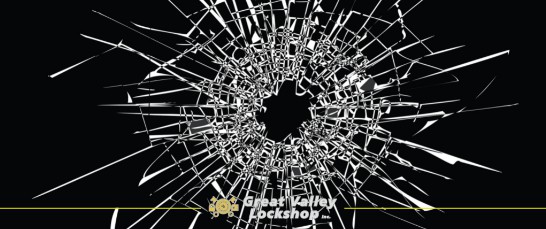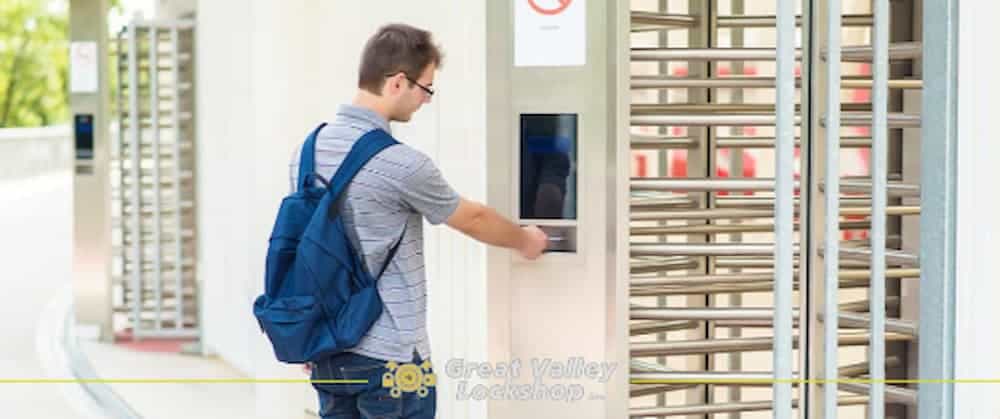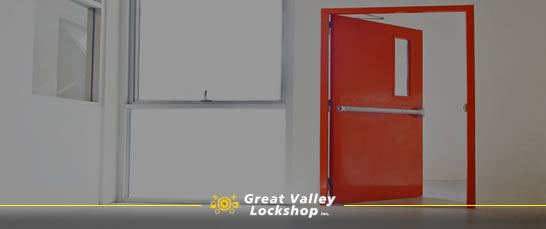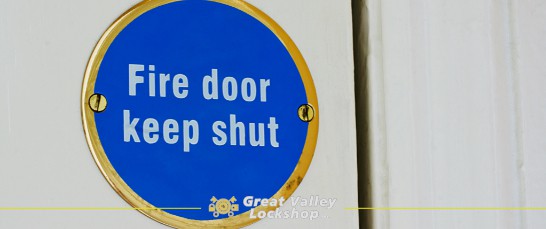
How to Remove and Replace Broken Glass in a Commercial Door
Because we like to help customers handle projects on their own as much as possible, we thought we would share this quick DIY tip.
How to Replace a Broken Glass Panel
When the door is in good condition, but the glass panel is cracked, chipped or shattered, this is the process for removing it safely and replacing the broken panel.
- Lay down a tarp or drop cloth around the area in which you’re working to help protect the area and allow you to dispose of it if the glass happens to fall out. Do this on both the interior area around the window, along with the exterior space.
- Put a double suction cup lifter in such a way that the glass won’t fall out of the frame as you work to remove the seal that is currently holding it in place.
- Remove the sections of vinyl or plastic gasket around the glass panel on all four sides. There will likely be small bits of glass stuck in the window frame. Use a stiff putty knife or a precision cutting knife to clear away any glazing or caulk.
- Use a flat-head screwdriver or similar tool to carefully create a lever between the panel frame and the glass.
- Detach the suction cup side from the door frame while leaving it attached to the broken glass panel. Use this as a handle to help you securely remove the panel and dispose of the glass.
- Insert the replacement panel in the frame using the double suction cup lifter in the reverse process to hold it in place as you work.
- Put the gasket back in place on the bottom of the frame where the panel is going to be inserted. You may need to use a rubber mallet and a straight edge to get it completely flush with the door frame and securely in place.
- Do the same for the other 3 sides.
- Clean the new glass panel thoroughly.
What type of glass is used in commercial doors?
The types of glass most commonly used for panels in commercial doors are:
- Tempered Glass: Tempered glass, also known as toughened glass, is created by heating the glass to high temperatures and then rapidly cooling it. This process increases the tensile strength of the glass, making it approximately four times stronger than regular glass. When broken, it shatters into small, less sharp pieces, minimizing the risk of injury. Laminated glass is made by sandwiching a layer of polyvinyl butyral (PVB) or ethylene-vinyl acetate (EVA) between two or more layers of glass. This interlayer keeps the layers of glass bonded even when broken, producing a “spider web” cracking pattern upon impact.
- Laminated Glass: This safety glass is known for its ability to stay intact even when shattered due to a layer of plastic sandwiched between two layers of glass. In commercial settings, this is beneficial as it maintains the security of the premises even if the glass is broken. It was that is designed with the aim of reducing the risks and severity of injuries in case it is broken. Laminated glass is produced through processes such as tempering and laminating to make it stronger than ordinary glass. There are two main types of safety glass, namely tempered glass and laminated glass.
- Fire-Resistant Glass: In commercial doors, glass that can withstand fire for a certain period of time can be used. This is typically a type of laminated glass that has a special fire-resistive material between the glass panels.
- Insulated Glass: For commercial doors facing the exterior, insulated glass might be used. It’s a type of double-paned glazing where the two pieces of glass are separated by a vacuum or gas-filled space to reduce heat transfer, making a building more energy-efficient.
- Bullet-Resistant Glass: In high-security commercial establishments, bullet-resistant glass might be used. It’s typically a type of laminated glass or a multi-layer polycarbonate thermoplastic and glass laminate.
Most glass used in commercial doors and window applications is laminated safety glass. This means that though you see that the glass panel is cracked or shattered, the panel stays in place and doesn’t shed shards of glass.
In high-traffic areas like commercial establishments, accidents and collisions are more likely. Safety glazing protects against injuries by breaking into less harmful pieces or by staying together even when shattered. Laminated safety glass can also act as a security feature thanks to its enhanced toughness and the interlayer that holds glass pieces together even when broken.
Related article: What Are Your Options for Secure Commercial Doors?
How to prevent another glass replacement situation?
For a lot of our customers with broken glass panels, we’ve been recommending that they replace them with polycarbonate panels. This innovative, new material is really an upgrade from glass.
Polycarbonate is a strong, lightweight, plastic material that offers several benefits over traditional glass. It’s 100 times more robust than glass and significantly lighter, leading to easier and faster installations. Its exceptional strength makes it virtually unbreakable, which is ideal for high-security environments such as prisons or mental health facilities, and it can withstand extreme weather, making it great for greenhouses and similar structures.
Enhanced with a protective layer, polycarbonate offers protection against UV rays and has improved longevity, even in constant sunlight. Unlike regular glass, it demonstrates impressive heat tolerance, capable of withstanding continuous high temperatures or sudden heat surges without absorbing heat or warping.
Additionally, polycarbonate boasts superior insulating properties compared to glass, which can lead to more energy-efficient buildings and reduced energy costs. With the ability to diffuse light, it can provide softer lighting environments, which are preferred in certain scenarios, such as greenhouses. Due to the high impact resistance, it is an ideal material for areas with high traffic as it maintains a clean and scratch-resistant finish.
Furthermore, polycarbonate comes in multiple colors and tints, offering further flexibility in design. With its unmatchable durability and resistance to harsh conditions, polycarbonate sheets provide a safe, cost-effective, and energy-efficient alternative to traditional glass.
Get Help from the Professionals
You can rely on GVLock locksmiths to help with all your commercial door installation and repairs. Contact us today.
Resources:
- A&C Plastics, “Commercial Glazing Facts,” accessed 2023.
- Piedmont Plastics, “Is Polycarbonate Better Than Glass?” April 2021.
- Brien Smyth, “Emergency Storefront Glass Replacement,” accessed 2023.








